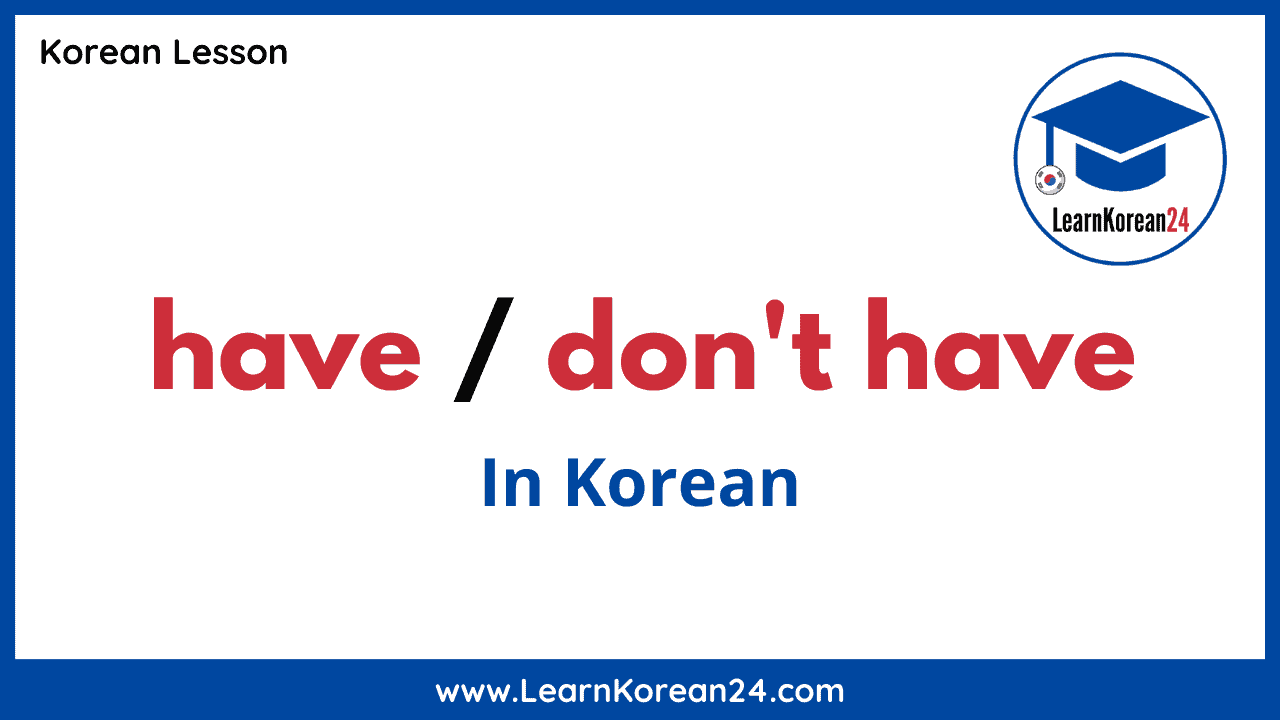How To Say ‘Have’ and ‘Don’t Have’ In Korean
In this lesson, you will learn how to say ‘have’ and ‘don’t have’ in Korean. The Korean words for ‘have’ and ‘don’t have’ can also be used to express ‘there is’ and ‘there isn’t’, meaning that something does or doesn’t exist.
The Korean words in this lesson are written in both Hangul and English. If you’ve not yet learned how to read the Korean alphabet, check out our complete Korean alphabet guide to help you learn how to read in Korean.
Have and Don’t Have in Korean
있어요 [i-sseo-yo]
있어요 [i-sseo-yo] comes from the verb 있다 which means ‘to exist’. When conjugated in the present polite tense 있다 becomes 있어요 [i-sseo-yo]. Listen to the audio below to hear how to say this word.
있어요 [i-sseo-yo] can mean ‘have‘ or ‘there is‘ depending on the situation. If you are talking about something in your possession, then 있어요 [i-sseo-yo] has the meaning of ‘have’. When talking about the existence of something, 있어요 [i-sseo-yo] has the meaning of ‘there is’. For example, 물 있어요 [mul i-sseo-yo] can mean both ‘I have water.’ and ‘there is water’.
없어요 [eop-seo-yo]
없어요 [eop-seo-yo] comes from the verb 없다 which means ‘to not exist’. When conjugated in the present tense 없다 becomes 없어요 [eop-seo-yo]. Listen to the audio below to hear how to pronounce this word.
없어요 [eop-seo-yo] can mean ‘don’t have’ or ‘there isn’t’ depending on the situation. If you are talking about something that you do not have in your possession, 없어요 [eop-seo-yo] has the meaning of ‘don’t have’. When talking about the absence of something 없어요 [eop-seo-yo] has the meaning of ‘there isn’t’. For example, 물 없어요 [mul eop-seo-yo] can mean both ‘I don’t have water.’ and ‘There isn’t water.’.
Making Sentences With 있어요 / 없어요
To make sentences with 있어요 [i-sseo-yo] and 없어요 [eop-seo-yo] you simply add the word for the thing that you have/don’t have or that exists/doesn’t exist before 있어요 [i-sseo-yo] or 없어요 [eop-seo-yo]. Let’s look at some example sentences. Try to read the Korean sentences below and then click on the audio to check the pronunciation.
| English | Korean | Audio |
|---|---|---|
| I have water. / There is water. | 물 있어요. [mul i-sseo-yo] | |
| I don’t have water / There isn’t water. | 물 없어요. [mul eop-seo-yo] | |
| I have money. / There is money. | 돈 있어요. [don i-sseo-yo] | |
| I don’t have money. / There isn’t money. | 돈 없어요. [don eop-seo-yo] |
Making Questions With 있어요
You can use 있어요 [i-sseo-yo] to ask questions such as ‘Do you have (something)?’ or ‘Is there (something)?. To make a question like this with 있어요 [i-sseo-yo] you simply raise your intonation at the end of the sentence to change it into a question. Here are some example sentences and questions.
| English | Korean | Audio |
|---|---|---|
| I have water. / There is water. | 물 있어요. | |
| Do you have water? / Is there water? | 물 있어요? | |
| I have money. / There is money. | 돈 있어요. | |
| Do you have money? / Is there money? | 돈 있어요? |
Are you ready to get serious about learning Korean? Start our 100% FREE online Korean language course today!

